News and Events
News and Events
The team of Research Centre for Future City of Peking University participated in the academic seminar of PEAK Urban international cooperation project in India
2019-03-12On January 10th to 19th 2019, Prof. Changchun Feng, Prof. Guangzhong Cao and Prof. Tao Liu from College of Urban and Environmental Sciences, Peking University, together with 5 postgraduates, as the team representatives of the Center for Urban Future Research, Peking University, participated in the annual academic seminar of PEAK Urban international multidisciplinary programme in Bangalore, India. Academic exchanges and cooperation in urban development research are the key contents of PEAK Urban programme. This symposium is an annual conference of PEAK Urban programme, organized by Indian Institute for Human Settlements (IIHS). It aims to discuss current results of research, promote the research work of PEAK Urban, and strengthen the exchanges and cooperation among scholars in the field of urban development research, especially young scholars.
More than 60 experts and scholars from 5 countries attended the seminar to discuss the future research directions in the field of urban development, which provided a good opportunity for international comparative research on urbanization and urban development, and also played a positive role in promoting exchanges and cooperation between Peking University, the University of Oxford, the University of Cape Town and other institutions.
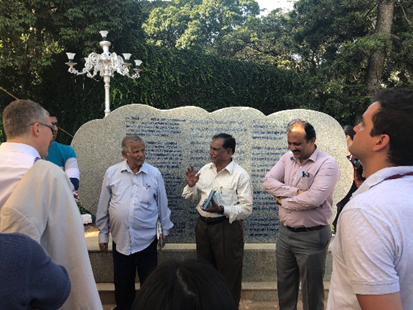
Group photo of team representatives of Centre for Urban Future City, Peking University
The annual workshop is an important communication and learning platform of PEAK Urban programme. The five-day meeting arrangement is rich and varied, including the expert introduction module, advisory board meeting, poster display module of research projects, literature reading module, field investigation and local visit module, lecture module, free communication module and so on.

Advisory board meeting of PEAK Urban project
Academic exchange is one of the main purposes of this seminar, involving the most types and number of modules. Representatives of every research teams displayed and reported the current progress of the programme, and had in-depth communication and interaction with scholars from participating countries. The sharing and discussion of the subject contents not only effectively promoted the familiarity of the research contents among each research project groups, but also provide an opportunity for the establishment of cooperative relations among research teams with similar research contents. At the same time, it also increases the academic knowledge of the researchers and expands the international vision.
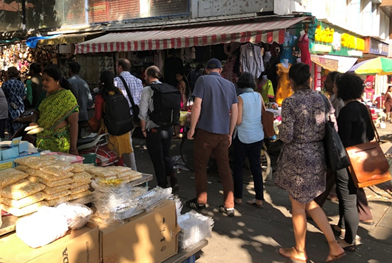
Poster display and sharing of each research team
The literature reading module provides a platform for scholars to think and communicate academically. Participants in the seminar conducted one-to-one literature reading and discussion activities, and had group communication and sharing.
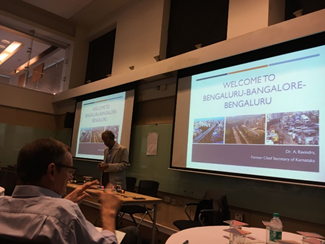
The literature reading and exchange module of the symposium
Mr. Ravindra, the former chief secretary of Karnataka state, whose capital is Bangalore, was invited to give a lecture about Bangalore. The lecture presents a comprehensive view of Bangalore’s past, present and future, including the history of urban development, population, economic development, urban expansion process, urban planning, urban issues and governance, etc. The question-and-answer session after the lecture further strengthened the scholars’ understanding of Bangalore and the whole of India.
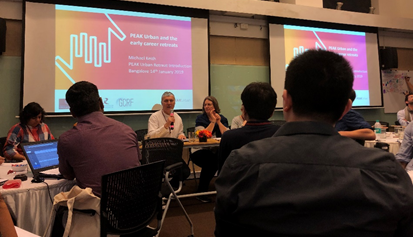
Mr. Ravindra gave a lecture about Bangalore
In addition to the academic exchange, the PKU team also conducted field trips to communities and business districts in the Bangalore. During the field trips, all the teams of PEAK Urban discussed about the urbanization, changes in cities` function and transformation of cities in developing countries.
On the afternoon of January 15th, the team first visited the Malleshwaram area. The area was planned and built after the plague in 1898. It covers a large area with wide roads, grid-like layouts, and complete underground pipeline facilities. It was once positioned as “model area”. The area is designed with Indian characteristics and is divided into eight isolated areas by caste and religion. Today, Malleshwaram is mainly to serve the local residents` market, as well as clothing, electronics, fruits and vegetables, flowers and other daily necessities and food.
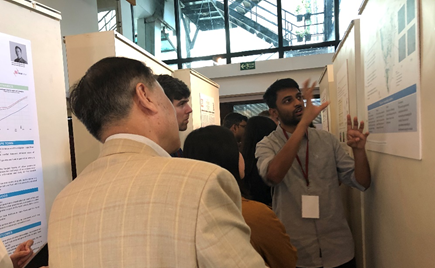
Participants visited the Malleshwaram area
On the afternoon of January 17th, the team visited the Lalbagh Park. The park has a long history, it was originally built at the end of the 18th century. In the colonial period, the British developed the site and built the park into a botanical garden with a variety of exotic plants. The park is a headquarter of the Marketing and Processing Cooperation Organization established by the Karnataka government for the farmers. It is also equipped with a market for various agricultural and sideline products in the exhibition.
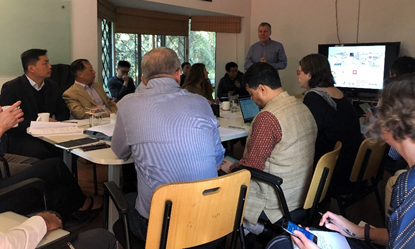
The research team visited the Lalbagh Park
Through academic reports and exchanges, lectures, field trips and seminars, all the members of PEAK Urban have gained a deeper understanding of urban development phenomena, characteristics and mechanisms such as urbanization research, urban housing and real estate, and urban transformation and development in developing countries. The PKU team expressed the desire and intention to continue to maintain academic exchanges in the field of urban research and further promote the scientific research cooperation between Peking University and various institutions.
About
PEAK Urban is a 51-month, international, multidisciplinary programme (PI Michael Keith, University of Oxford) funded by the UK Research and Innovation Global Challenges Research Fund (UKRI GCRF), involving researchers at the University of Oxford, Peking University, University of Cape Town, the Indian Institute for Human Settlements, and EAFIT University. Prof. Changchun Feng is the leader of PKU team and also a member of the board committee. Prof. Guangzhong Cao is a member of the board committee. Prof. Pengjun Zhao, Prof. Tao Liu and Prof. Zhenjie Wang are in the PKU team.
